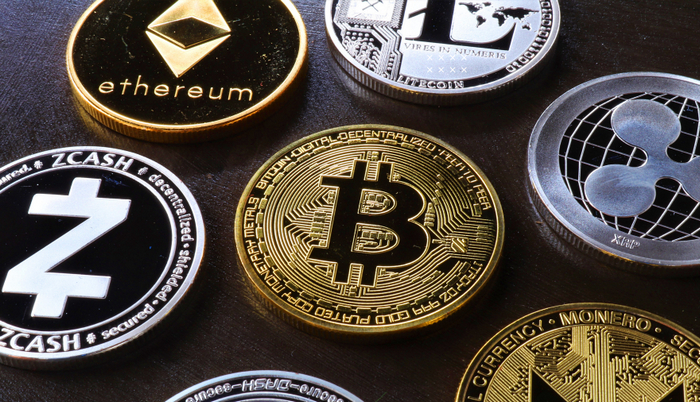-
 Bitcoin
Bitcoin $78,858.0549
3.37% -
 Ethereum
Ethereum $1,566.6420
4.93% -
 Tether USDt
Tether USDt $0.9997
0.06% -
 XRP
XRP $1.8749
6.74% -
 BNB
BNB $557.6248
3.33% -
 USDC
USDC $1.0000
0.02% -
 Solana
Solana $108.0897
7.68% -
 Dogecoin
Dogecoin $0.1512
9.92% -
 TRON
TRON $0.2349
4.06% -
 Cardano
Cardano $0.5830
7.07% -
 UNUS SED LEO
UNUS SED LEO $8.9852
0.53% -
 Toncoin
Toncoin $3.0853
2.07% -
 Chainlink
Chainlink $11.6136
8.63% -
 Stellar
Stellar $0.2286
6.18% -
 Avalanche
Avalanche $16.9054
10.47% -
 Shiba Inu
Shiba Inu $0.0...01124
4.34% -
 Sui
Sui $2.0188
11.71% -
 Hedera
Hedera $0.1552
15.18% -
 MANTRA
MANTRA $6.2582
2.16% -
 Polkadot
Polkadot $3.5807
5.15% -
 Bitcoin Cash
Bitcoin Cash $279.1110
7.96% -
 Litecoin
Litecoin $71.4798
8.61% -
 Dai
Dai $1.0002
0.03% -
 Ethena USDe
Ethena USDe $0.9990
0.07% -
 Bitget Token
Bitget Token $4.1088
6.33% -
 Hyperliquid
Hyperliquid $11.8594
16.49% -
 Pi
Pi $0.5785
3.24% -
 Monero
Monero $205.0707
7.08% -
 Uniswap
Uniswap $5.1567
5.49% -
 OKB
OKB $51.9753
4.05%
What is a Public Key Infrastructure?
In a blockchain environment, PKI provides enhanced security, efficient identity management, and improved transparency, ensuring the authenticity and integrity of transactions.
Nov 23, 2024 at 12:30 am

What is a Public Key Infrastructure?
Introduction
A Public Key Infrastructure (PKI) is a framework that enables secure communication over a network by managing digital certificates and public-key cryptography. PKI plays a crucial role in various blockchain applications, ensuring data integrity, authentication, and non-repudiation.
Components of a PKI
A PKI consists of several key components:
- Certificate Authority (CA): A trusted entity that issues digital certificates, which verify the identity of entities participating in secure communication.
- Digital Certificate: An electronic document that binds a public key to a specific entity, such as a website, organization, or individual.
- Public Key Cryptography: An encryption method that uses a pair of keys (public and private) to secure data transmission.
How PKI Works
- Certificate Issuance: A CA issues a digital certificate after verifying the identity of an entity. The certificate contains the entity's public key and other relevant information.
- Public Key Exchange: When two entities (e.g., a client and server) wish to communicate securely, they exchange their public keys.
- Encryption and Decryption: Data sent from one entity to another is encrypted using the recipient's public key. Only the recipient, who holds the corresponding private key, can decrypt the data.
- Authentication Verification: Digital certificates allow entities to verify each other's identities by validating the certificates issued by trusted CAs.
- Non-Repudiation: Blockchain technology ensures that transactions and communications secured by PKI cannot be repudiated, providing proof of authenticity and validity.
Benefits of PKI in Blockchain
- Enhanced Security: PKI secures blockchain networks against unauthorized access and data breaches, protecting sensitive information and user privacy.
- Identity Management: PKI provides reliable identity verification for both individuals and organizations, fostering trust and accountability within blockchain ecosystems.
- Improved Transparency: Digital certificates provide a transparent record of transactions and communications, enhancing auditability and forensic analysis capabilities.
- Reduced Fraud: PKI mitigates the risk of fraud and counterfeit goods by verifying the authenticity of digital assets and transactions.
- Increased Efficiency: By automating processes such as identity verification and encryption, PKI streamlines blockchain operations and improves efficiency.
Conclusion
PKI plays a pivotal role in securing and enhancing the functionality of blockchain networks. By providing secure communication and identity management mechanisms, PKI empowers organizations and individuals to confidently engage in blockchain-based transactions, applications, and services.
Disclaimer:info@kdj.com
The information provided is not trading advice. kdj.com does not assume any responsibility for any investments made based on the information provided in this article. Cryptocurrencies are highly volatile and it is highly recommended that you invest with caution after thorough research!
If you believe that the content used on this website infringes your copyright, please contact us immediately (info@kdj.com) and we will delete it promptly.
- Despite Periods of Uncertainty in the Crypto Market, Long-Range Predictions Remain Strong for Several Key Players
- 2025-04-08 17:25:12
- Trump Media and Technology Group (TMTG) to Launch Bitcoin (BTC) and Cronos (CRO) Exchange-Traded Funds (ETFs)
- 2025-04-08 17:25:12
- BTFD Coin: The Bulls Are Rallying the Troops, GIGA Pumps 34%
- 2025-04-08 17:20:12
- The meme coin market is showing serious signs of life again in 2025
- 2025-04-08 17:20:12
- ‘Black Monday Sell-off’ was a rough day for the crypto industry
- 2025-04-08 17:15:12
- Hyperliquid May Be On Track to Become FTX 2.0 After Controversial Handling of the JELLY Token Incident
- 2025-04-08 17:15:12
Related knowledge

What is Ethereum’s Slashing mechanism and how to punish malicious behavior?
Feb 20,2025 at 03:08am
Key PointsOverview of slashingDifferent types of slashing in EthereumIncentives and consequences of slashingIdentifying and reporting slashed validatorsOngoing discussions and potential improvementsEthereum's Slashing Mechanism: Punishing Malicious BehaviorEthereum's slashing mechanism is an essential tool for ensuring network security and punishing mal...

What is the verifier node of Ethereum and how to become a verifier?
Feb 19,2025 at 06:00pm
The Verifier Node of Ethereum: A Comprehensive GuideKey Points:What is a Verifier Node?How to Become a Verifier NodeResponsibilities and Rewards of a Verifier NodeMinimum Requirements for Becoming a Verifier NodePotential Difficulties in Running a Verifier Node1. What is a Verifier Node?A Verifier Node is an independent entity on the Ethereum network th...

What is Ethereum’s staking, and how to participate and earn money?
Feb 19,2025 at 04:37pm
Key Points:Understanding Ethereum's Staking MechanismSteps to Participate in StakingBenefits and Rewards of StakingSecurity and Risk ConsiderationsTechnical Requirements and Hardware OptionsPotential Challenges and Troubleshooting TipsFAQs on Ethereum StakingWhat is Ethereum's Staking?Proof-of-Stake (PoS) is a consensus mechanism used in blockchain netw...

What is Ethereum’s DAO (Decentralized Autonomous Organization) and how does it work?
Feb 20,2025 at 03:12am
Key PointsDefinition and Structure of a DAOGovernance and Decision-Making in DAOsBenefits and Use Cases of DAOsChallenges and Limitations of DAOsWhat is Ethereum's DAO (Decentralized Autonomous Organization) and How Does It Work?Definition and Structure of a DAOA Decentralized Autonomous Organization (DAO) is an innovative governance and management fram...

What is Ethereum's multi-signature wallet and how to improve security?
Feb 20,2025 at 02:18pm
Key Points:Understanding the Concept of a Multi-Signature WalletBenefits and Drawbacks of Multisig WalletsRequirements for Setting Up a Multisig WalletStep-by-Step Guide to Generating a Multisig WalletImplementing Strategies for Enhanced Security1. Understanding the Concept of a Multi-Signature WalletA multi-signature (multisig) wallet in the Ethereum e...

What is Ethereum's oracle and how to provide data for smart contracts?
Feb 21,2025 at 01:30am
Key Points:Understanding the concept of oracles in EthereumExploring different types of oraclesDetailed guide on how to provide data for smart contractsAddressing potential challenges and considerationsWhat is Ethereum's Oracle?Oracles are crucial components in the Ethereum ecosystem, enabling smart contracts to access real-world data and off-chain even...

What is Ethereum’s Slashing mechanism and how to punish malicious behavior?
Feb 20,2025 at 03:08am
Key PointsOverview of slashingDifferent types of slashing in EthereumIncentives and consequences of slashingIdentifying and reporting slashed validatorsOngoing discussions and potential improvementsEthereum's Slashing Mechanism: Punishing Malicious BehaviorEthereum's slashing mechanism is an essential tool for ensuring network security and punishing mal...

What is the verifier node of Ethereum and how to become a verifier?
Feb 19,2025 at 06:00pm
The Verifier Node of Ethereum: A Comprehensive GuideKey Points:What is a Verifier Node?How to Become a Verifier NodeResponsibilities and Rewards of a Verifier NodeMinimum Requirements for Becoming a Verifier NodePotential Difficulties in Running a Verifier Node1. What is a Verifier Node?A Verifier Node is an independent entity on the Ethereum network th...

What is Ethereum’s staking, and how to participate and earn money?
Feb 19,2025 at 04:37pm
Key Points:Understanding Ethereum's Staking MechanismSteps to Participate in StakingBenefits and Rewards of StakingSecurity and Risk ConsiderationsTechnical Requirements and Hardware OptionsPotential Challenges and Troubleshooting TipsFAQs on Ethereum StakingWhat is Ethereum's Staking?Proof-of-Stake (PoS) is a consensus mechanism used in blockchain netw...

What is Ethereum’s DAO (Decentralized Autonomous Organization) and how does it work?
Feb 20,2025 at 03:12am
Key PointsDefinition and Structure of a DAOGovernance and Decision-Making in DAOsBenefits and Use Cases of DAOsChallenges and Limitations of DAOsWhat is Ethereum's DAO (Decentralized Autonomous Organization) and How Does It Work?Definition and Structure of a DAOA Decentralized Autonomous Organization (DAO) is an innovative governance and management fram...

What is Ethereum's multi-signature wallet and how to improve security?
Feb 20,2025 at 02:18pm
Key Points:Understanding the Concept of a Multi-Signature WalletBenefits and Drawbacks of Multisig WalletsRequirements for Setting Up a Multisig WalletStep-by-Step Guide to Generating a Multisig WalletImplementing Strategies for Enhanced Security1. Understanding the Concept of a Multi-Signature WalletA multi-signature (multisig) wallet in the Ethereum e...

What is Ethereum's oracle and how to provide data for smart contracts?
Feb 21,2025 at 01:30am
Key Points:Understanding the concept of oracles in EthereumExploring different types of oraclesDetailed guide on how to provide data for smart contractsAddressing potential challenges and considerationsWhat is Ethereum's Oracle?Oracles are crucial components in the Ethereum ecosystem, enabling smart contracts to access real-world data and off-chain even...
See all articles






















































































